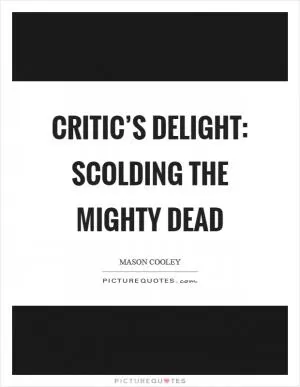Every literary critic believes he will outwit history and have the last word

Every literary critic believes he will outwit history and have the last word
Mason Cooley, an American aphorist known for his concise and insightful observations on life, literature, and human nature, once said, "Every literary critic believes he will outwit history and have the last word." This statement encapsulates the hubris and ambition that often drive critics to analyze and interpret works of literature in an attempt to shape the narrative of literary history.Literary criticism is a field that is inherently subjective, as critics bring their own biases, perspectives, and experiences to their analysis of a text. They seek to uncover the deeper meanings, themes, and messages within a work of literature, and in doing so, they often assert their own interpretations as the definitive reading of the text. This desire to have the final say, to be the ultimate authority on a particular work, is what Cooley alludes to in his aphorism.
Critics often believe that their analysis will stand the test of time, that future generations will look back on their interpretations as the most insightful and accurate. They strive to leave their mark on literary history, to shape the way that a particular work is understood and appreciated by readers for years to come. In this sense, critics see themselves as arbiters of taste, gatekeepers of culture, and custodians of the literary canon.
However, history is not always kind to critics. As literary tastes change, as new perspectives and voices emerge, the interpretations of critics can be challenged, revised, or even dismissed altogether. What one critic sees as a masterpiece, another may see as a failure. What one critic praises as innovative, another may condemn as derivative. The battle for the last word in literary criticism is ongoing and ever-shifting, as new generations of critics enter the fray and offer their own perspectives on the works of the past.












 Friendship Quotes
Friendship Quotes Love Quotes
Love Quotes Life Quotes
Life Quotes Funny Quotes
Funny Quotes Motivational Quotes
Motivational Quotes Inspirational Quotes
Inspirational Quotes